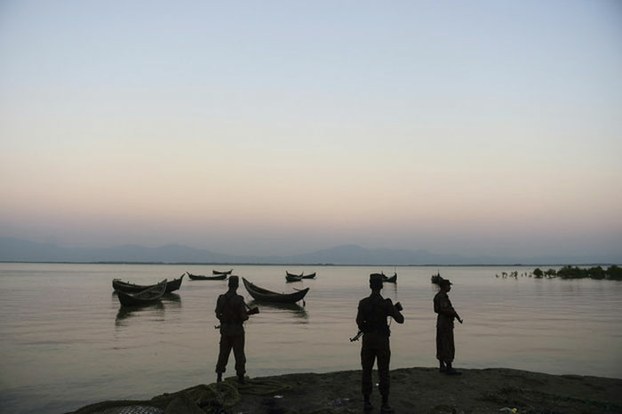Bangladesh complains to Myanmar about Rohingya cross-border arrivals
| Publisher | Radio Free Asia |
| Publication Date | 23 November 2016 |
| Cite as | Radio Free Asia, Bangladesh complains to Myanmar about Rohingya cross-border arrivals, 23 November 2016, available at: https://www.refworld.org/docid/5848122913.html [accessed 26 May 2023] |
| Disclaimer | This is not a UNHCR publication. UNHCR is not responsible for, nor does it necessarily endorse, its content. Any views expressed are solely those of the author or publisher and do not necessarily reflect those of UNHCR, the United Nations or its Member States. |
2016-11-23
 Bangladesh Border Guard personnel stand watch for illegal entry of Rohingya Muslims along the banks of the Naaf River, Nov. 23, 2016. AFP
Bangladesh Border Guard personnel stand watch for illegal entry of Rohingya Muslims along the banks of the Naaf River, Nov. 23, 2016. AFP
Bangladesh's government complained Friday about an influx of Rohingya Muslims from neighboring Myanmar, following reports that hundreds have crossed the border as they flee killings and the burning of homes in Rakhine state.
Border-police officials from both countries met Friday in the southeastern Bangladeshi district of Cox's Bazar to discuss the situation along their shared frontier, while Dhaka summoned Myanmar's ambassador to lodge a complaint about the violence in Rakhine – a western state in predominantly Buddhist Myanmar where the Rohingya minority is concentrated.
"[We have] raised our deep concern at the situation in Rakhine state. We have urged them to improve the situation there for the Rohingyas to return to their homes," Bangladeshi Additional Foreign Secretary Kamrul Ahsan told reporters after summoning Myanmar Ambassador U Myo Myint Ahasan to his ministry.
Ahsan said he handed the envoy a diplomatic letter conveying Bangladesh's concern about the new influx of Rohingya Muslims into Teknaf and Ukhia, two sub-districts in Cox's Bazar.
"We have told them that [Rohingya] are sneaking into Bangladesh," Col. Khandker Farid Hasan, the southeast commander of Border Guard Bangladesh (BGB), told reporters in Cox's Bazar after a meeting with a 31-member delegation representing Myanmar's frontier police.
"They informed us that they were also aware of this. We, the two parties, discussed ways to stop such illegal entry," he said, noting that the two sides had agreed to cooperate in sharing information about cross-border movements of Rohingya.
The ambassador and members of the border-guard delegation from Myanmar did not talk to Bangladeshi media afterward.
The comments by Bangladeshi officials were the government's first admission that Rohingya had succeeded in crossing into southeastern Bangladesh amid a crackdown by Myanmar authorities that followed the early October killings of nine Myanmar police officers during attacks on border posts in Rakhine's Muangdaw township.
At least 86 people have been killed and more than 30,000 displaced by the violence in Rakhine, the worst outbreak since hundreds were killed in inter-communal violence in 2012, which caused thousands of Rohingya to flee to Bangladesh, Reuters reported Wednesday.
Last week, Bangladeshi officials said they had sealed the border and pushed back hundreds of Rohingya who were seeking refuge in Bangladesh.
On Wednesday, Abdul Majid, the officer-in-charge of police in Teknaf, told BenarNews,an RFA-affiliated online news service, that the border guard and coast guard had transferred 70 Rohingya and four human smugglers into police custody after they were caught crossing the frontier.
'They will obliterate us'
Hundreds of Rohingya have made it over to the Bangladeshi side while others are still waiting to cross the frontier along the Naaf River that separates Rakhine from Cox's Bazar, according to news reports and eyewitness accounts this week.
Md Ayub, a Rohingya who succeeded in crossing the river, said he had fled Rakhine to save himself.
"From here, I can see our village burning. Allah knows what happened to my wife, daughter, mother and others. Please save us. They will obliterate us," he told BenarNews by phone.
Ayub said the Myanmar security forces set fire to villages along the Naaf River to force Rohingya to sail into Bangladesh territory.
"Hundreds of Rohingya have been waiting to cross into Bangladesh. They have no way to save lives," he said.
Earlier this week, New York-based Human Rights Watch reported that an analysis of satellite imagery showed that 820 additional structures had been destroyed in five Rohingya villages between Nov. 10 and 18, bringing the total number of burned buildings that HRW claims to have documented in Rakhine to 1,250.
On Nov. 16, a spokesman for Myanmar's government refuted HRW allegations that 430 buildings in three Rohingya villages had been burned, saying the actual number was 155 and militants had committed the arson.
The Rohingya are a stateless people who have suffered from persecution in Myanmar, where they are considered to be "Bengalis," or illegal immigrants from Bangladesh.
About 300,000 to 500,000 Rohingya are thought to live in Bangladesh, mostly in Cox's Bazar district, according to Bangladeshi government estimates.
"At least 1,000 Rohingya have entered into Bangladesh; many of them have taken shelter inside the refugee camps," a resident of a Rohingya camp in Ukhita told BenarNews on the condition of anonymity, referring to the latest influx.
Reported by Kamran Reza Chowdhury for BenarNews, an RFA-affiliated online news service.
Link to original story on RFA website
